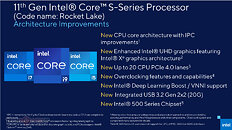Monday, November 2nd 2020

Intel Rocket Lake-S CPU Benchmarked: Up to 22% Faster Compared to the Previous Generation
Just a few days ago, Intel has decided to surprise us and give out information about its upcoming Rocket Lake-S platform designed for desktop users. Arriving early next year (Q1) the Rocket Lake-S platform is yet another iteration of the company's 14 nm node. However, this time we are getting some real system changes with a new architecture design. Backporting its Golden Cove core to 14 nm, Intel has named this new core type Cypress Cove. What used to be the heart of Ice Lake CPUs, is now powering the Rocket Lake-S platform. Besides the new core, there are other features of the platform like PCIe 4.0, new Xe graphics, and updated media codecs. You can check that out here.
Today, we have gotten the first benchmarks of the Intel Rocket Lake-S system. In the Userbenchmark bench, an unknown eight-core Rocket Lake CPU has been compared to Intel's 10th generation Comet Lake-S processors. The Rocket Lake engineering sample ran at 4.2 GHz while scoring a single-core score of 179. Compared to the Core i9-10900K that runs at 5.3 GHz, which scored 152 points, the Cypress Cove design is 18% faster. And if the new design is compared to the equivalent 8C/16T Compet Lake CPU like Core i7-10700K clocked at 5.1 GHz and scoring 148 points, the new CPU uarch is up to 22% faster. This represents massive single-threaded performance increases, however, please take the information with a grain of salt, as we wait for the official reviews.
Source:
WCCFTech
Today, we have gotten the first benchmarks of the Intel Rocket Lake-S system. In the Userbenchmark bench, an unknown eight-core Rocket Lake CPU has been compared to Intel's 10th generation Comet Lake-S processors. The Rocket Lake engineering sample ran at 4.2 GHz while scoring a single-core score of 179. Compared to the Core i9-10900K that runs at 5.3 GHz, which scored 152 points, the Cypress Cove design is 18% faster. And if the new design is compared to the equivalent 8C/16T Compet Lake CPU like Core i7-10700K clocked at 5.1 GHz and scoring 148 points, the new CPU uarch is up to 22% faster. This represents massive single-threaded performance increases, however, please take the information with a grain of salt, as we wait for the official reviews.



75 Comments on Intel Rocket Lake-S CPU Benchmarked: Up to 22% Faster Compared to the Previous Generation
Rocket Lake's Cypress Cove is between Sunny Cove and Willow Cove, a modified/improved Sunny Cove backported to 14nm.
As I said in some other thread, this result is suspicious. If Rocket Lake in this test is at 5GHz, the result is very respectable. If the measured 4.2GHz is true and 4.2GHz Rocket Lake does 18% over 5.3GHz Comet Lake, that would be ~40% single-thread performance increase. That benchmark does measure boost clock for single-thread test and results for both 10700K and 3800K scale as expected with the measured clock. Maybe it is just unable to read the frequency from ES Rocket Lake?
152 / 5.3 = 28.679
equals to 48.6% IPC improvement.
I guess the research days in area 51 finally pays off.
Jokes aside... that looks promising, much like the last few years were full of promises :)
Plus take into account that this may be a heavily optimized benchmark so not a real-world performance representation.
Btw, the results used for comparison in the news post are incorrect. 159 points seems to be right for Comet Lake at about 5.1 GHz (both 10700K or 10900K), 5.3GHz gets 165 points.
That Rocket Lake score is 12-13% faster than 5.1GHz Comet Lake (10700K max boost) and 8-9% faster than 5.3GHz Comet Lake (10900K max boost).
Assuming 4.2 GHz Rocket Lake, then frequency-normalized this is still ~38% that sounds way too much.
My primary OS is Debian:
CPU = sometimes it cant boot, sometimes the OS crash if the SSD is on the Asmedia Chip
GPU = Vulcan dont work right, RX 5700 have a Hardwarebug with Audio via HDMI
There is only one reason to switch from Intel/Nvidia to AMD, u wanna pay a lot of cash to be a Beta tester.:laugh:
Not to mention that there are all kinds of odd instructions that execute either much faster or much slower going from one architecture to another.
Maybe the EU, Lawrence Livermore National Laboratory & any other Supercomputer operator should get your memo o_O